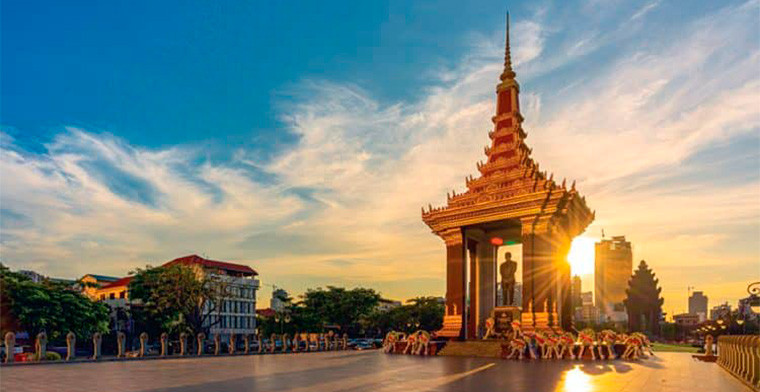Cambodian PM Manet Prohibits New Casinos in Two Provinces
Monday 29 de July 2024 / 12:00
2 minutos de lectura
(Phnom Penh).-The same law prohibits all Cambodians from gambling inside casinos, although all forms of gambling are illegal outside of them

Prime Minister Hun Manet has banned the establishment of new casinos in Kep and Kampot provinces, except for Bokor Mountain where they currently operate. Nationwide, Cambodia currently has a total of 184 licensed gambling establishments.
In a recent decision, Manet stated that the ban on new gaming resorts in these areas is to “diversify investment in hotel and hospitality, tourism, manufacturing, industry, agriculture, trade and special economic zones [SEZs].”
The letter added that the ban also aims to strengthen and promote cultural and religious preservation, ensure security and improve order in tourist destinations.
Currently, most of the country’s casinos are located in coastal areas (100, including those on Bokor Mountain in Kampot). There are 48 in the provinces bordering Thailand and 35 along the border with Vietnam, while Phnom Penh has one, according to figures released by the Commercial Gambling Management Commission of Cambodia (CGMC).
Article 19 of the Law on Management of Commercial Gaming, promulgated in 2020, prohibits gambling establishments in certain geographical locations for the sake of cultural and religious conservation or other necessities.
However, casinos built in certain areas before the law was enacted are exceptions, as stated in Article 20.The same law prohibits all Cambodians from gambling inside casinos, although all forms of gambling are illegal outside of them. In 2023, state revenue from commercial games of chance exceeded $20 million.
Yong Kim Eng, president of the People Center for Development and Peace, said that casinos do not bring much benefit to the nation. On the contrary, he noted they can cause some people to fall into debt, even though the law prohibits locals from taking part in the activity.
In his view, the government should maintain only existing establishments, such as in Sihanoukville, Bavet town in Svay Rieng province and Poipet town in Banteay Meanchey.
Chhort Bunthang, a Cultural Relations, Education and Tourism research officer at the Royal Academy of Cambodia, believes that the decision to ban casinos in the two provinces is likely because the country already has enough.
He noted that most of them are located along the borders, which is different from some countries, such as the US, where casinos are situated in landlocked areas. However, he acknowledged that Cambodia may have more casinos than its neighbours.
Regarding casino revenue, he stated that it contributes to the national budget. However, he said gambling is against the law and unconventional in Cambodian culture.
“Apart from generating revenue for the state, casinos provide income for investors and employees. By law, Cambodian citizens are not allowed to enter casinos. But the question is whether we can control this. If managed well, it will not affect our people, but poor management could have negative consequences,” he added.
Based on the interpretation of tourism experts, Bunthang said that foreigners who enter the country for gaming are considered tourists.
“The important thing is to manage according to our legal principles so that our people do not get involved in gambling. We now see gambling in casinos and online games. The question is how to prevent our citizens from playing these games while recognising that casinos also benefit our national budget,” he said.
Categoría:Others
Tags: Sin tags
País: Cambodia
Región: Asia
Event
ICE Barcelona 2026
19 de January 2026
Merkur Group Shines in Barcelona with Triple ICE Triumph
(Espelkamp/Barcelona).- Merkur Group secures three prestigious international accolades for operational excellence, social commitment, and standout exhibition experience.
Friday 06 Feb 2026 / 12:00
Eduardo Aching: "ICE 2026 was an exceptional event for Konami and its casino partners"
(Barcelona, SoloAzar Exclusive).- Eduardo Aching, Vice President of iGaming & International Gaming Operations at Konami Gaming, reflects on the company’s standout participation at ICE 2026, the strong reception to Solstice 49C and Konami Online Interactive, and the strategic push toward emerging regulated markets and expanded global partnerships.
Friday 06 Feb 2026 / 12:00
Belatra Games Strengthens LatAm Expansion and Innovation Strategy After ICE Barcelona 2026
(Barcelona, SoloAzar Exclusive).- Kateryna Goi, Chief Marketing Officer at Belatra Games, shares her assessment of the company’s participation in ICE Barcelona 2026, the quality of industry engagement at the event, and the strategic priorities shaping Belatra’s growth in 2026, with a strong focus on Latin America and narrative-driven innovation.
Friday 06 Feb 2026 / 12:00
SUSCRIBIRSE
Para suscribirse a nuestro newsletter, complete sus datos
Reciba todo el contenido más reciente en su correo electrónico varias veces al mes.



















